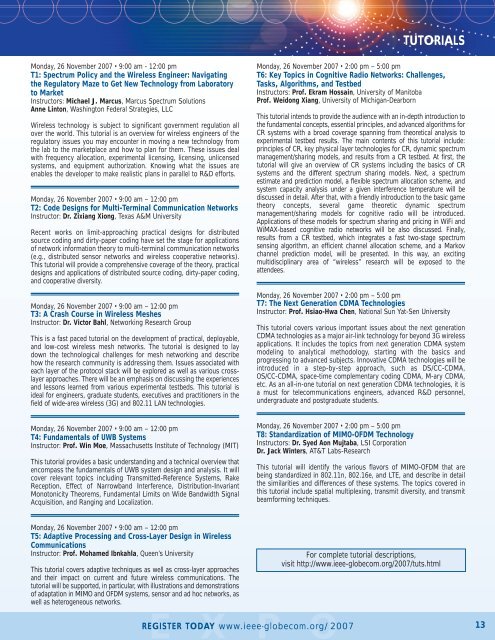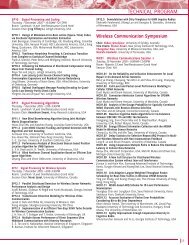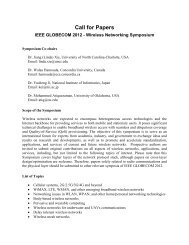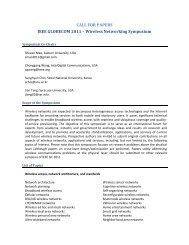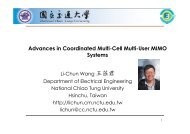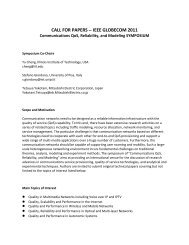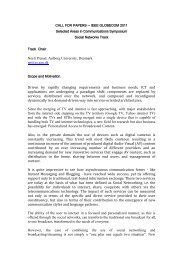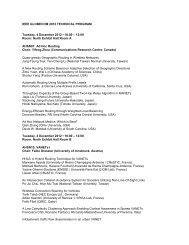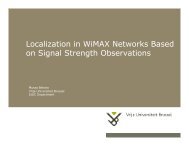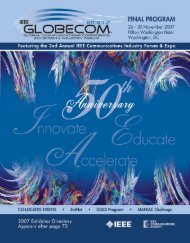information - IEEE GLOBECOM 2013
information - IEEE GLOBECOM 2013
information - IEEE GLOBECOM 2013
Create successful ePaper yourself
Turn your PDF publications into a flip-book with our unique Google optimized e-Paper software.
TUTORIALS<br />
Monday, 26 November 2007 • 9:00 am - 12:00 pm<br />
T1: Spectrum Policy and the Wireless Engineer: Navigating<br />
the Regulatory Maze to Get New Technology from Laboratory<br />
to Market<br />
Instructors: Michael J. Marcus, Marcus Spectrum Solutions<br />
Anne Linton, Washington Federal Strategies, LLC<br />
Wireless technology is subject to significant government regulation all<br />
over the world. This tutorial is an overview for wireless engineers of the<br />
regulatory issues you may encounter in moving a new technology from<br />
the lab to the marketplace and how to plan for them. These issues deal<br />
with frequency allocation, experimental licensing, licensing, unlicensed<br />
systems, and equipment authorization. Knowing what the issues are<br />
enables the developer to make realistic plans in parallel to R&D efforts.<br />
Monday, 26 November 2007 • 9:00 am – 12:00 pm<br />
T2: Code Designs for Multi-Terminal Communication Networks<br />
Instructor: Dr. Zixiang Xiong, Texas A&M University<br />
Recent works on limit-approaching practical designs for distributed<br />
source coding and dirty-paper coding have set the stage for applications<br />
of network <strong>information</strong> theory to multi-terminal communication networks<br />
(e.g., distributed sensor networks and wireless cooperative networks).<br />
This tutorial will provide a comprehensive coverage of the theory, practical<br />
designs and applications of distributed source coding, dirty-paper coding,<br />
and cooperative diversity.<br />
Monday, 26 November 2007 • 9:00 am – 12:00 pm<br />
T3: A Crash Course in Wireless Meshes<br />
Instructor: Dr. Victor Bahl, Networking Research Group<br />
This is a fast paced tutorial on the development of practical, deployable,<br />
and low-cost wireless mesh networks. The tutorial is designed to lay<br />
down the technological challenges for mesh networking and describe<br />
how the research community is addressing them. Issues associated with<br />
each layer of the protocol stack will be explored as well as various crosslayer<br />
approaches. There will be an emphasis on discussing the experiences<br />
and lessons learned from various experimental testbeds. This tutorial is<br />
ideal for engineers, graduate students, executives and practitioners in the<br />
field of wide-area wireless (3G) and 802.11 LAN technologies.<br />
Monday, 26 November 2007 • 2:00 pm – 5:00 pm<br />
T6: Key Topics in Cognitive Radio Networks: Challenges,<br />
Tasks, Algorithms, and Testbed<br />
Instructors: Prof. Ekram Hossain, University of Manitoba<br />
Prof. Weidong Xiang, University of Michigan-Dearborn<br />
This tutorial intends to provide the audience with an in-depth introduction to<br />
the fundamental concepts, essential principles, and advanced algorithms for<br />
CR systems with a broad coverage spanning from theoretical analysis to<br />
experimental testbed results. The main contents of this tutorial include:<br />
principles of CR, key physical layer technologies for CR, dynamic spectrum<br />
management/sharing models, and results from a CR testbed. At first, the<br />
tutorial will give an overview of CR systems including the basics of CR<br />
systems and the different spectrum sharing models. Next, a spectrum<br />
estimate and prediction model, a flexible spectrum allocation scheme, and<br />
system capacity analysis under a given interference temperature will be<br />
discussed in detail. After that, with a friendly introduction to the basic game<br />
theory concepts, several game theoretic dynamic spectrum<br />
management/sharing models for cognitive radio will be introduced.<br />
Applications of these models for spectrum sharing and pricing in WiFi and<br />
WiMAX-based cognitive radio networks will be also discussed. Finally,<br />
results from a CR testbed, which integrates a fast two-stage spectrum<br />
sensing algorithm, an efficient channel allocation scheme, and a Markov<br />
channel prediction model, will be presented. In this way, an exciting<br />
multidisciplinary area of “wireless” research will be exposed to the<br />
attendees.<br />
Monday, 26 November 2007 • 2:00 pm – 5:00 pm<br />
T7: The Next Generation CDMA Technologies<br />
Instructor: Prof. Hsiao-Hwa Chen, National Sun Yat-Sen University<br />
This tutorial covers various important issues about the next generation<br />
CDMA technologies as a major air-link technology for beyond 3G wireless<br />
applications. It includes the topics from next generation CDMA system<br />
modeling to analytical methodology, starting with the basics and<br />
progressing to advanced subjects. Innovative CDMA technologies will be<br />
introduced in a step-by-step approach, such as DS/CC-CDMA,<br />
OS/CC-CDMA, space-time complementary coding CDMA, M-ary CDMA,<br />
etc. As an all-in-one tutorial on next generation CDMA technologies, it is<br />
a must for telecommunications engineers, advanced R&D personnel,<br />
undergraduate and postgraduate students.<br />
Monday, 26 November 2007 • 9:00 am – 12:00 pm<br />
T4: Fundamentals of UWB Systems<br />
Instructor: Prof. Win Moe, Massachusetts Institute of Technology (MIT)<br />
This tutorial provides a basic understanding and a technical overview that<br />
encompass the fundamentals of UWB system design and analysis. It will<br />
cover relevant topics including Transmitted-Reference Systems, Rake<br />
Reception, Effect of Narrowband Interference, Distribution-Invariant<br />
Monotonicity Theorems, Fundamental Limits on Wide Bandwidth Signal<br />
Acquisition, and Ranging and Localization.<br />
Monday, 26 November 2007 • 2:00 pm – 5:00 pm<br />
T8: Standardization of MIMO-OFDM Technology<br />
Instructors: Dr. Syed Aon Mujtaba, LSI Corporation<br />
Dr. Jack Winters, AT&T Labs-Research<br />
This tutorial will identify the various flavors of MIMO-OFDM that are<br />
being standardized in 802.11n, 802.16e, and LTE, and describe in detail<br />
the similarities and differences of these systems. The topics covered in<br />
this tutorial include spatial multiplexing, transmit diversity, and transmit<br />
beamforming techniques.<br />
Monday, 26 November 2007 • 9:00 am – 12:00 pm<br />
T5: Adaptive Processing and Cross-Layer Design in Wireless<br />
Communications<br />
Instructor: Prof. Mohamed Ibnkahla, Queen’s University<br />
This tutorial covers adaptive techniques as well as cross-layer approaches<br />
and their impact on current and future wireless communications. The<br />
tutorial will be supported, in particular, with illustrations and demonstrations<br />
of adaptation in MIMO and OFDM systems, sensor and ad hoc networks, as<br />
well as heterogeneous networks.<br />
For complete tutorial descriptions,<br />
visit http://www.ieee-globecom.org/2007/tuts.html<br />
E X P O<br />
REGISTER TODAY www.ieee-globecom.org/2007 13


